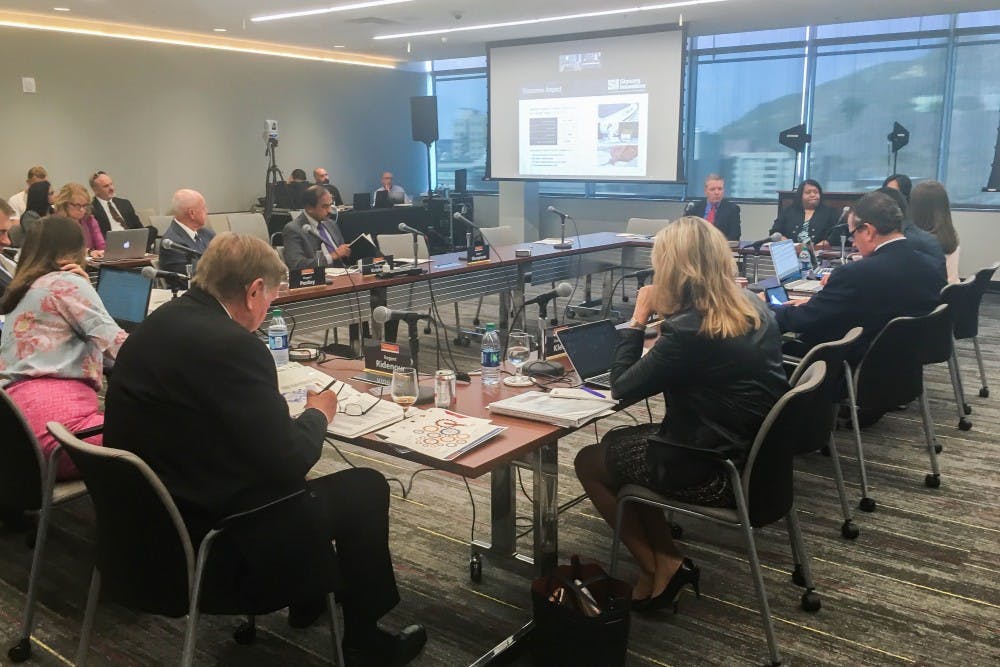When Attorney General Mark Brnovich sued the Arizona Board of Regents last Thursday, the board had already been a month into efforts to better regulate university real estate developments after changing its existing policy last year.
But the policy change was not enough to stave off the upcoming legal battle between the attorney general and the state's main regulatory body for public universities.
Read more: Attorney General sues ABOR over ASU real estate projects
In December, ABOR revised its land leasing policy, attempting to further regulate the three universities in its purview with regards to leasing out tax-exempt public property.
One notable clause of the policy revision states that “universities shall not engage in long-term leases that are commercial in nature if the primary purpose is to remove private land or real property improvements from property tax rolls.”
Brnovich's lawsuit, which mostly targeted ASU's practice of leasing tax-exempt public land to private businesses, called out the addition to ABOR’s policy as being insufficient to control universities' practices.
“These (ABOR) policies, which merely constitute vague, non-preclusive mandates on universities, do not foreclose deals that would run afoul of Article 9 of the [Arizona] Constitution, nor stop future unlawful or unauthorized developments,” the lawsuit said.
Article 9 of the Constitution provides rules for public debt, revenue and taxation, including taxation on property.
ASU defends their real estate practices by saying they are not taking away tax funds from schools because the land is tax-exempt regardless of who rents it, it provides funds for other university activities, and it generates jobs.
Sean McCarthy, senior research analyst for the Arizona Tax Research Association and an outspoken critic of ASU’s real estate practices, said that while ABOR's policy change was a step in the right direction, it still allowed the board to let universities continue these types of deals.
“This is a fairly weak policy in that all ABOR has to do is say that as long as it benefits the university in some way they’re going to continue to do these deals,” McCarthy said. “It’s purely subjective."
Lorenzo Martinez, the Vice President of Finance and Administration of ABOR, said the policy change attempted to adapt the board's policies to the changing nature of real estate development at ASU.
“Historically, leasing would typically occur through what we call a public-private partnership, and that's where land would be used," Martinez said. "The private developer would come in, and, historically, it would be for dorms, so whatever would be built would be for University use."
While ASU's recent ventures deal with more commercial development, Martinez said the deals were approved because they are still linked to University operations.
Read more: ABOR responds to Attorney General lawsuit over real estate projects
“Recently, we had these transactions come forward where there would be commercial development that wouldn’t necessarily be used by the University, but that would benefit the University and have a connection to the University," Martinez said.
But it was these commercial properties that raised concerns for McCarthy two years ago.
He released a report in 2017 that took an in-depth look at the board's tax-free properties, focusing on the controversial Marina Heights development along Tempe Town Lake. While the report did not raise issue with the practice of leasing to private entities itself, it criticized the properties' tax-exempt status, saying it harmed taxpayers and local governments.
“The issue is not whether they’re allowed to have private developments on campus,” McCarthy said. “The question is whether or not it would be illegal for them after they built it, essentially to pretend that it’s the University’s building, even though they didn’t build it and a private person controls it and makes all the money off it."
McCarthy said all of this is a “paper game” to "harvest the property tax" — in other words, ASU incentivizes businesses to use its land by charging rent that undercuts the property taxes they would pay elsewhere.
In this arrangement, typically called a "leaseback," the University lets the business rent the deed while avoiding taxation on the building, he said.
McCarthy and his association are not the only ones who have been concerned about these lease agreements. Last year, former Republican state representative and now state Senator Vince Leach, proposed a bill that would have prevented ABOR from allowing the universities to participate in these tax-exempt transactions.
While Marina Heights is the most common talking point in the controversy over ASU's real estate deals, Leach said his interest in the issue started with ASU’s research park located in Chandler, Arizona.
“I saw that there’s a Walgreens in there and there’s an Amazon fulfillment center, and so I said to myself, ‘how can that be research?’” Leach said.
Leach said he brought this controversy to the attention of the attorney general in 2017 when he felt that ABOR was not sufficiently answering his questions.
“I asked for an opinion from the attorney general in April of last year,“ Leach said. “One of the things that we had kept asking in discussions with ABOR is we were looking for statutory authority or any authority that would allow them to enter into these agreements that would evade taxes.
"That was never provided," he said. "And so that’s when I requested the opinion of the AG.”
ABOR’s revised policy applies to all three universities. But Martinez said that so far, only ASU has been leasing land for commercial development.
“NAU has done some of that public private partnership for dorms … But again, that is for university use,” Martinez said. “UA has some land in what they refer to as their tech park at the bridges and they’ve got a master plan to potentially do some commercial development, but they have stated that they wouldn’t necessarily use the model that ASU is using.”
Reach the reporter at mzhao49@asu.edu and follow @michelle_zhao23 on Twitter.
Like The State Press on Facebook and follow @statepress on Twitter.




